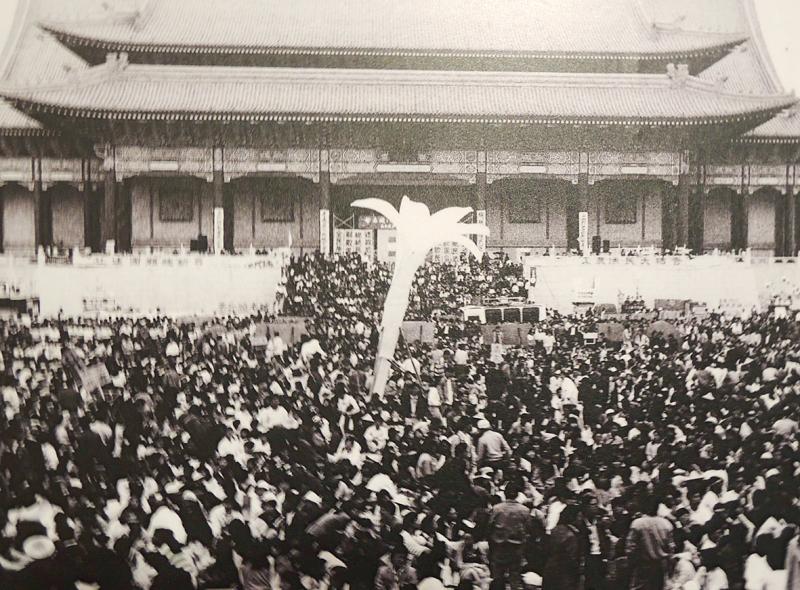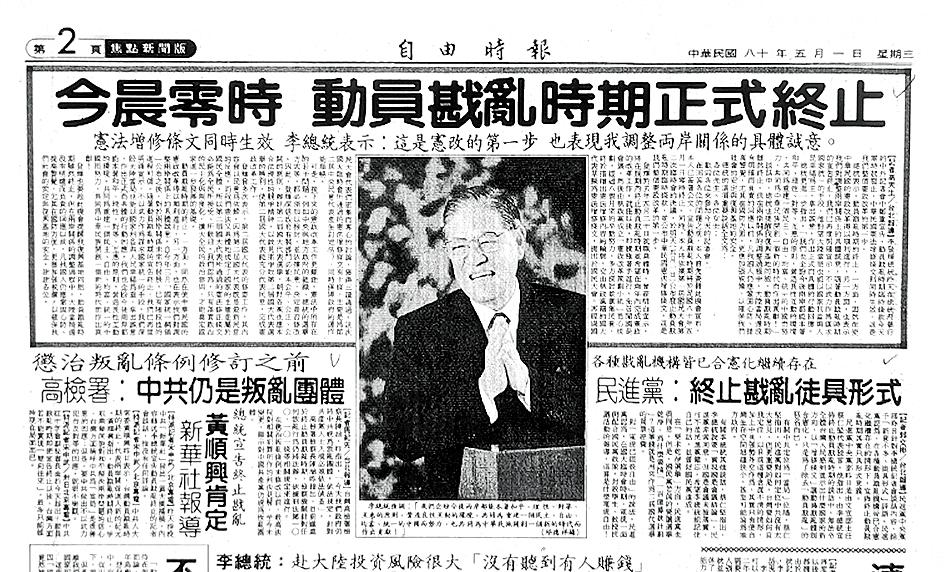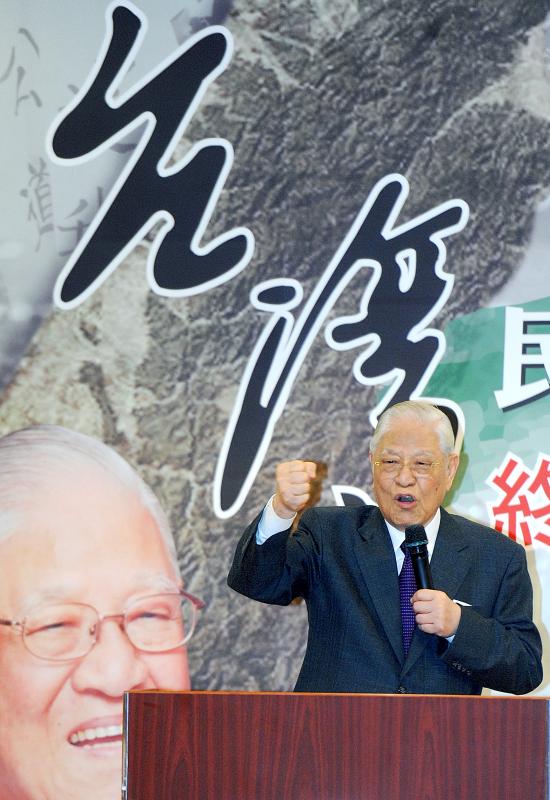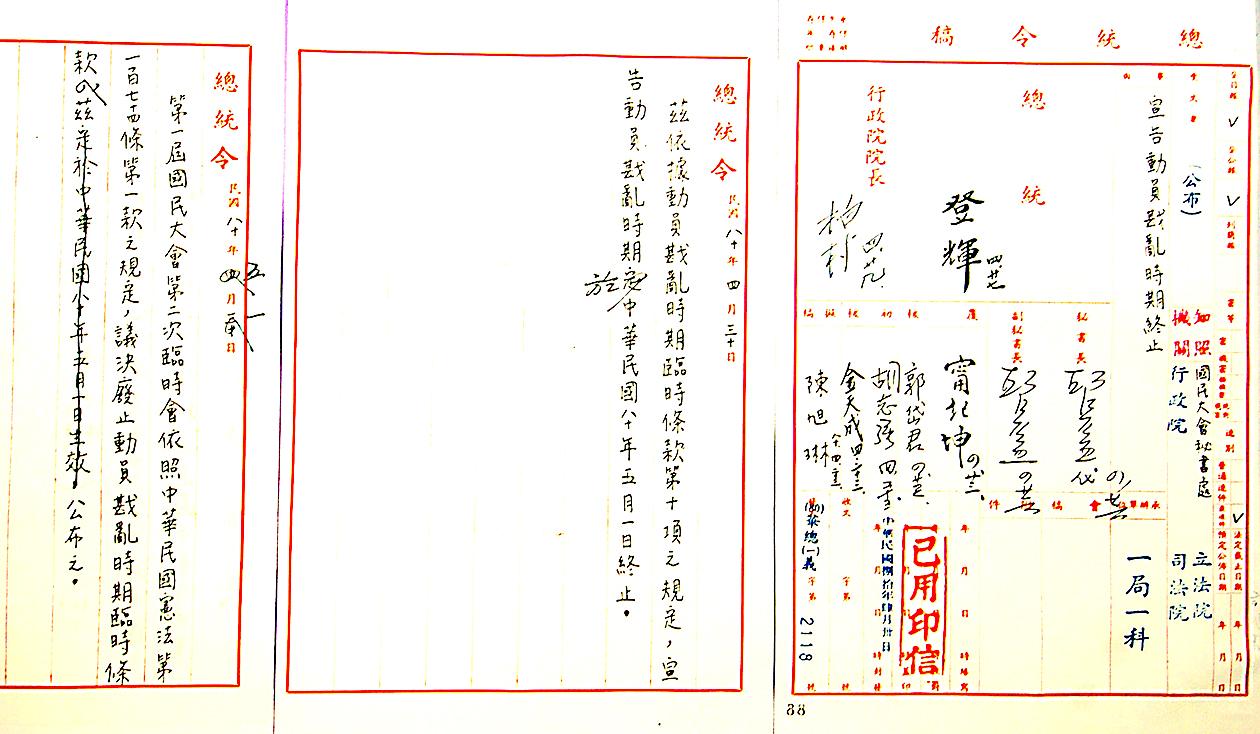April 26 to May 2
Although the Chinese Nationalist Party (KMT) had essentially given up retaking China by the late 1960s, they continued to espouse the notion until former president Lee Teng-hui (李登輝) declared in a press conference on April 30, 1991: “We will no longer seek to unify China through force.”
Lee was announcing the repeal of the Temporary Provisions Effective During the Period of National Mobilization for Suppression of the Communist Rebellion (動員戡亂時期臨時條款, temporary provisions for short), which had allowed the government to rule with an iron fist for nearly 43 years without following the Constitution.

Photo: Tang Chia-ling, Taipei Times
Although martial law was lifted in 1987, the provisions remained in place and their abolishment was one of the main demands for democracy activists, including the thousands of students who gathered in March 1990 at Chiang Kai-shek Memorial Hall in what would be known as the Wild Lily student movement.
Democracy activist Deng Nan-jung (鄭南榕) wrote in the December 1988 edition of his magazine Freedom Era Weekly that the temporary provisions “suffocated Taiwan’s political system … and is the source of all chaos in Taiwanese politics.”
Deng never got to see the hated law scrapped. The authorities charged him with sedition and he self-immolated on April 7, 1989 when the police came to his office to arrest him. This only showed that, even though martial law had been lifted, the White Terror continued.

Photo: Han Cheung, Taipei Times
On the sixth day of the student movement, Lee met with the protest leaders and heard their demands. In June, he convened a national affairs conference, where among other items, the representatives decided to put an end to the temporary provisions and return to full constitutional rule.
A Liberty Times (Taipei Times’ sister paper) editorial stated, “It is hard to believe that two-thirds of the 2 million people in Taiwan have lived their entire life under the cloud of the [temporary provisions]. There is no need to celebrate, however. When our descendants ask us how we were able to stand this monster for so long, we can only hang our heads in shame.”
INDEFINITE EMERGENCY

Photo: Liao Chen-hui, Taipei Times
The Chinese Civil War was raging in July 1947 when former president Chiang Kai-shek (蔣介石) announced the Period of Mobilization for the Suppression of Communist Rebellion to “save the people in the liberated areas, ensure the survival of our people, strengthen the unity of our country and suppress the Chinese Communist Party in order to achieve constitutional rule on schedule.”
The Constitution, which was promulgated in January 1947, went into effect on Dec. 25. As the situation worsened, the KMT wanted to expand Chiang’s power but felt that amending the Constitution so quickly would be unpopular. After deliberating, they decided to add the temporary provisions, which were adopted on May 10, 1948 and set to expire two years later.
Wang Shih-chieh (王世杰), one of the National Assembly members who proposed the temporary provisions, wrote, “If the government is bound to the Constitution, it won’t be able to react to the nation’s immediate needs to suppress the rebellion … But if we change the Constitution now, the people will think we are disrespecting the law. Our proposed act is temporary, once the rebellion is suppressed, it will expire.”

Taipei Times file photo
The KMT retreated to Taiwan in 1949, but they refused to admit defeat and continued to see the CCP as a rebel group. Thus, the temporary provisions remained in place and were extended indefinitely in 1954.
They continued to provide the basis for martial law, White Terror, one-party rule and indefinite presidential terms for Chiang.
It was amended three times over the following decade, with each amendment granting Chiang more privileges under the pretense of wartime emergency.
Chiang’s last serious attempt to invade China failed to materialize in 1965, but he clutched onto his emergency powers until his death in 1975. After the lifting of martial law, protests against the KMT exploded and continued to intensify — two large-scale events rocked the capital in the month leading up to Lee’s announcement.
NEW RELATIONSHIP
Not everybody supported repealing the temporary provisions, especially unificationists. A 1988 article in the magazine Journal of Sunyatsenism (三民主義學報) claims that the laws “contributed invaluably to ensuring the stability of our base to retake China,” and that it has provided flexibility to deal with the “division of the country.”
To them, the war was still going on and repealing the provisions were not suited for these “emergency times” — only that the emergency had lasted for four decades with no resolution in sight. Most importantly, with the repeal of the temporary provisions, the Chinese Communist Party would no longer be seen as a rebel group.
“From now on, we will see the Chinese Communist Party as a political entity that controls the mainland region and we will call them the ‘mainland authorities’ or the ‘Chinese Communist authorities,” Lee said during the press conference, and referred to then-Chinese leader Yang Shangkun (楊尚昆) as “Chairman Yang.” Lee also acknowledged the independence of Mongolia, which the KMT continued to claim over the decades.
Reporters had many questions about this new relationship. Would Lee visit China in the future?
“If they invite me over as the president of the Republic of China, I think I would give it a try,” he replied.
However, Lee spoke against Chinese psychological warfare to “divide the people of Taiwan” and noted that the Straits Exchange Foundation would remain the sole official contact point with Beijing, who continued to threaten Taiwan and marginalize it internationally.
The People’s Daily , the CCP’s main mouthpiece, welcomed the move, calling for both sides to establish direct flights, mail and trade. It would take 12 more years for the first cross-strait charter plane to leave Taiwan.
Another effect of the repeal is that temporary martial law was declared on May 1, 1991 in Kinmen and Matsu, which were administered as war zones. This was lifted, along with the war zone designation, the following November. in January, went into effect on Dec. 25. As the situation worsened, the KMT wanted to expand Chiang’s power but felt that amending the Constitution so quickly would negatively affect popular sentiment. After deliberation, they decided to add the temporary provisions, which were adopted on May 10, 1948 and set to expire after two years.
The KMT lost the war and retreated to Taiwan in 1949, but the provisions remained. They were extended indefinitely in 1954, and continued to provide the basis for martial law, White Terror, one-party rule and indefinite presidential terms for Chiang.
Taiwan in Time, a column about Taiwan’s history that is published every Sunday, spotlights important or interesting events around the nation that either have anniversaries this week or are tied to current events.

Jacques Poissant’s suffering stopped the day he asked his daughter if it would be “cowardly to ask to be helped to die.” The retired Canadian insurance adviser was 93, and “was wasting away” after a long battle with prostate cancer. “He no longer had any zest for life,” Josee Poissant said. Last year her mother made the same choice at 96 when she realized she would not be getting out of hospital. She died surrounded by her children and their partners listening to the music she loved. “She was at peace. She sang until she went to sleep.” Josee Poissant remembers it as a beautiful

March 2 to March 8 Gunfire rang out along the shore of the frontline island of Lieyu (烈嶼) on a foggy afternoon on March 7, 1987. By the time it was over, about 20 unarmed Vietnamese refugees — men, women, elderly and children — were dead. They were hastily buried, followed by decades of silence. Months later, opposition politicians and journalists tried to uncover what had happened, but conflicting accounts only deepened the confusion. One version suggested that government troops had mistakenly killed their own operatives attempting to return home from Vietnam. The military maintained that the

Before the last section of the round-the-island railway was electrified, one old blue train still chugged back and forth between Pingtung County’s Fangliao (枋寮) and Taitung (台東) stations once a day. It was so slow, was so hot (it had no air conditioning) and covered such a short distance, that the low fare still failed to attract many riders. This relic of the past was finally retired when the South Link Line was fully electrified on Dec. 23, 2020. A wave of nostalgia surrounded the termination of the Ordinary Train service, as these train carriages had been in use for decades

Lori Sepich smoked for years and sometimes skipped taking her blood pressure medicine. But she never thought she’d have a heart attack. The possibility “just wasn’t registering with me,” said the 64-year-old from Memphis, Tennessee, who suffered two of them 13 years apart. She’s far from alone. More than 60 million women in the US live with cardiovascular disease, which includes heart disease as well as stroke, heart failure and atrial fibrillation. And despite the myth that heart attacks mostly strike men, women are vulnerable too. Overall in the US, 1 in 5 women dies of cardiovascular disease each year, 37,000 of them